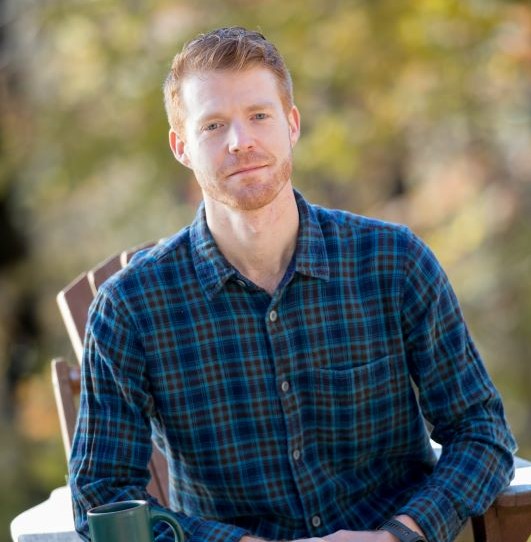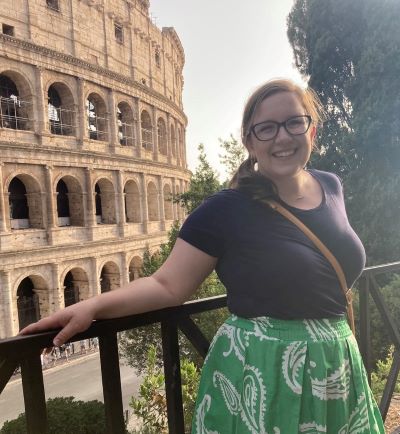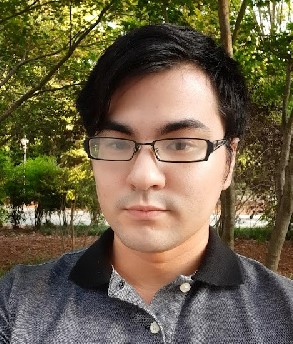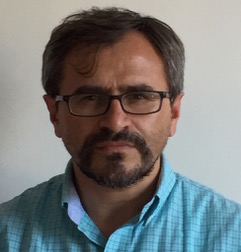22-23 Mellon Public Humanities Teaching Fellows
Wyatt Harris (Religion)

Wyatt Harris is a doctoral candidate in Theological Studies. His dissertation, titled “The Doctrine of Justification and the Problem of Antiblackness” offers a constructive account of the Christian doctrine of justification in light of contemporary questions, especially those of race and antiblackness. This project analyzes recent accounts of, and debates surrounding, the Christian doctrine of justification, especially in the Lutheran tradition, and routes these through relevant concerns raised by both black theologians and radical black studies scholars, with a particular focus on Afropessimism, and argues that the doctrine must account for, and be informed by, such concerns in order to be adequately expressed and understood today. His writing has appeared in the Journal of Reformed Theology and Scriptura. Prior to his doctoral studies, he served as adjunct faculty in the Alabama Community College System’s Marion Military Institute and taught World Religions, New Testament Survey, and Old Testament Survey. Wyatt received his BA in English from The University of Mississippi and his M.Div from Beeson Divinity School, Samford University.
Course Description
Title: REL370: Christianity and Anti-black Racism
Time: Spring 2023
This course introduces students to the common and contemporary issues of race and racism in dialogue with, and through the lens of, religion. In particular, this course will examine the connections and disjunctions between Western Christianity, on the one hand, and whiteness and antiblack racism, on the other. The course will introduce students to the historical religious and theological origins of racial thought and practice, as well as such racism’s sustenance by both religion and theology in our contemporary context. To accomplish these tasks, this course engages the work of three major black theologians: James Cone, Delores Williams, and Willie James Jennings. To add further clarity, we will also examine a sampling of works of scholars in the field of Black Studies who offer critical analyses of the phenomena of whiteness, slavery, and antiblackness in an effort to better grasp the issues and stakes of antiblack racism. A central question this course asks and addresses is the following: What blocks communication and communion between black and white religious discourses and communities? In particular, what do black writers and scholars, theologians and academics, claim forms this blockage? And what, if any, religious ideas or doctrines help clarify, and or possibly offer constructive solutions for, such blockage?
The theoretical aspects of this course are inflected by the public nature of the issue. This course attends to the presence of racism in contemporary society, especially in religious/Christian contexts, presuming that racism is deeply problematic. Due to racism’s vividly public presence in civil society, and aware that religion is a significant aspect of civil society, students will be tasked with formulating public-facing responses, analyses, and projects. In this way, the learning and awareness gained in this course take on public scope focused on particular communal/religious contexts. All of this theoretical analysis and learning is geared toward addressing one of society’s greatest issues: communication and communion between white and black and the racism which blocks said communication and communion.
Hyun Woo Kim (Religion)

Hyun Woo Kim is a doctoral candidate at Emory University. He specializes in the Hebrew Bible/Old Testament. Hyun Woo focuses his research on the textual formation of the Bible in light of the ancient Near East’s visual cultural milieu. His dissertation project explores ways in which the visual scheme of the Achaemenid-Persian empire had a signification on the textual (re-)formation of post-exilic Hebrew poetry.
Hyun Woo has a master’s in the Hebrew Bible from Yale Divinity School, an M.Div. from Candler School of Theology at Emory, and a bachelor's from Yonsei University (South Korea). As a provisional elder of the United Methodist Church and a son of a dedicated pastor, Hyun Woo is also passionate about the communities in faith. He embodies a pastoral concern for biblical literacy, ecumenism, intercultural vision, and emancipatory ministries of the church.
Course Description
Title: The Bible in Current Controversies
Time: Spring 2023
There has been no such time as the present when “faith” is viewed as the most contradictory way to make sense of the world. With the ever-growing number of media platforms, contentious expressions of religious perspectives are found in every corner of the public sphere. Many people claim to espouse biblical values to support such beliefs. Consider, for example, politicians who quote a Bible verse in their presidential letters or literally hold a physical copy of the Bible to appeal to the public. On a local level, it is not difficult to see faith activists stand outside an organization picketing a “Bible” quote. These are just a few examples of the Bible being used as a controversial inflamer in the public. Then, can we say that the Bible itself is the root of controversies?
This course will examine what the Bible has to say about several controversial issues such as Bible vs. science, abortion, homosexuality, violence, and gun control. Students will reflect on the difficulty of identifying a single, or even a dominant, biblical perspective on such issues. In addition to the Bible itself, the class will survey diverse articulations and current receptions of the Bible, including verbal, visual, ritual, and in-person accounts. Through this public-facing observation, students will develop skills to assess the (ir-)relevance of biblical texts to modern debates. With the aim of establishing a public scholarship, students will also have opportunities to generate community-engaged projects such as mini-ethnographic practices, infographics, podcasts, and ScholarBlogs.
Annie Maloney (Art History)

Annie Maloney is a Ph.D. Candidate at Emory University. She received her B.A. in art history from Boston College in 2014. Her research interests include seventeenth-century painting, drawing, and print culture, antiquarianism, and global Baroque studies. Annie was a recipient of the Mellon Fellowship in Object-Oriented Research in 2018. In addition to her academic pursuits Annie has also worked as the editorial assistant for the Lovis Corinth Colloquium and a Summer Mellon Intern at the Michael C. Carlos Museum on the Quire Digital Catalog publishing team. Her dissertation, Saving Roman Painting: The Antiquarian Reproductions of Pietro Santi Bartoli (1635-1700), investigates how seventeenth-century artists responded to the discovery of ancient frescoes in tombs and subterranean chambers across Rome through a study of the drawings, watercolors, and etchings of Pietro Santi Bartoli.
Course Description
Title: The Global Baroque & The Digital Humanities
Time: Spring 2023
The word “Baroque,” typically conjures notions of European masters creating theatrical displays celebrating the absolute monarchs and religious leaders of Europe. However, the political, cultural, and religious sentiments that formed on the European continent traveled well beyond its shores on the ships of merchants, missionaries, and colonists. In this course we will examine Baroque art and architecture in its global context, considering how artistic styles and practices spread to and from the “four corners of the world.” Particular attention will be paid to Rome as the diplomatic center of this global exchange through the study of early modern materials at Emory’s Rose Library, Michael C. Carlos Museum, and Pitts Theology Library.
Simultaneously, we will consider how ideas and information spread from the ivory towers of academia to the public in the twenty first century through exemplary museum exhibitions and digital projects that seek to engage a broad audience. Each week students will draw meaningful connections between the history of baroque art and advances in the public humanities today through weekly blog posts and written assignments. At the end of the semester, students will submit a construct an educational unit for a collaborative Emory Scholars Blog on Global Baroque Art.
Kyle Tanaka (Philosophy)

Kyle Tanaka is a 7th year Philosophy PhD candidate. He received his B.A. in Philosophy with a minor in Economics from California State University, Stanislaus, and his M.A. in Philosophy with a specialization in aesthetics from Stony Brook University. His work examines how academic institutions shape pedagogical goals and practices in the discipline of philosophy. He is presently completing his dissertation, "Philosophy Shelved: Philosophy's Displacement in the Library," which examines how the collection, organization, and presentation of philosophy in academic libraries norms philosophy in U.S. academia.
Course Description
Title: Queer Subjects
Time: Spring 2023
Keywords, labels, tags, pronouns—the modern world is filled with ways to identify gender, sex, and sexuality, both for ourselves and others. In the last few decades, how exactly these terms identify and what terms should be used have raised numerous questions: What do such terms mean? Who gets to use or apply them? What do we mean when we refer to someone or something as “queer, “trans,” etc.?
In this course, we will examine what it means to identify and represent gender and sexuality in a specific context: libraries. We will do so in two veins:
- Theory. What ideas inform how we think about gender and sexuality? How are such ideas normalized? How are they disrupted, challenged, or queered? What relationship does biology have with sex and gender? What does the application of a term—e.g. a tag or a classification—claim to be doing when we identify someone/something?
- Practice. With all the complications, twists, and turns we find in discussions of sex and gender, how do we make decisions about representation and relevance? In this course, we will undertake two projects (outlined later in the syllabus) that will examine what it means to collect, organize, and present materials on a particular topic.
Samantha Wrisley (WGSS)

Samantha Pinson Wrisley is a Ph.D. Candidate in The Department of Women’s, Gender, and Sexuality Studies at Emory University. Samantha is a graduate of Georgia State University’s Women’s, Gender, and Sexuality Studies MA program (2017). She completed her undergraduate work in Clinical/Experimental Psychology (BSc) and Women’s Studies (BA) at the University of Georgia (2014). Samantha's research is interested in the ways in which affects shape and motivate both feminist and anti-feminist movements. Her dissertation, titled "Misogyny, A Condition," argues that misogyny is best conceptualized as a both an affective condition of ambivalence produced by feelings toward and perceptions of “woman” as Other and a condition of gender normativity. Her work has been published in the journal Feminist Theory and is forthcoming in the journal Capacious.
Course Description
Title: The Sexual Politics of Hate
Time: Spring 2023
Taking sexuality and politics as its starting point, this applied humanities course engages with and in public scholarship to understand and respond to various forms of identity-based hatred such as misogyny, sexism, racism, homophobia, transphobia, and classism. The course begins by introducing the critical theoretical frameworks necessary to ground a public scholarship approach by reading canonical feminist and anti-racist texts, as well as material that closely examines the social/emotional workings of identity-based hatred. Throughout, students will engage in both individual and collectivized forms of public scholarship through a variety of assignments, such as podcasts, zines, op-eds, speeches, press releases, and video documentaries, culminating in a collaborative group project of their choice. Together, we will think critically about the nature of hate and how public scholarship can be used to effectively respond to and neutralize hate in the public sphere.
Riza Yildirim (Religion)

Riza Yildirim (Ph.D., Bilkent University) holds a Ph.D. in history and is currently completing his second Ph.D. in the Graduate Division of Religion at Emory University. His research focuses on the history and religiosity of Qizilbash- Alevi, Bektashi, and similar shari‘a-inattentive, Shi‘i-oriented Muslim traditions in the Middle East. He is the author of five books (in Turkish) and numerous articles. His current dissertation examines the religious system of the Qizilbash, the politico- military elites of the Safavid Iran. His research combines Ottoman, Safavid, and Qizilbash-Alevi sources (both written and oral).
Course Description
Title: REL/MESAS 270, Diversity and Dissent in Muslim Societies
Time: Spring 2023
The perception of Islam in the Western public is mostly dominated by a number of stereotypical imageries, which create an impression that Muslims are all the same across the globe. Such a reductionist vision disregards countless forms of Islamic practices during both the premodern and modern periods. This course offers an exploration of doctrinal, ritual, social, and cultural plurality across the Islamic societies. It starts with a general survey of the question of religious plurality in Islam. After examining the Sunni, Shi‘ite, and Sufi forms of Islam, we will continue with an investigation of the question of orthodoxy and heterodoxy in Islam and explore the lesser known minority groups in the Islamic world. In the second half of the course, we will focus on diverse traditions and religiosities among contemporary Muslims living both in the Muslim-majority countries and the West. We will also explore how modern Muslims deal with the questions of race, gender, feminism, LGBT, and cultural pluralism.
This course adopts principles and techniques of the community-engaged learning, which highlights connecting academic knowledge to experience in community. In addition to the conventional lectures, in-class discussions, and class materials, students will enrich their learning through engagement with Muslim communities beyond campus. They will also apply their skills and knowledge gained in the classroom in their research assignments to be done in the real community environment. By doing so, students and community partners will act as active participants of teaching-learning experience, co-educators, and mediators to disseminate knowledge in community. In a collaborative and transdisciplinary spirit, we will produce and learn knowledge that is responsive to public audience.